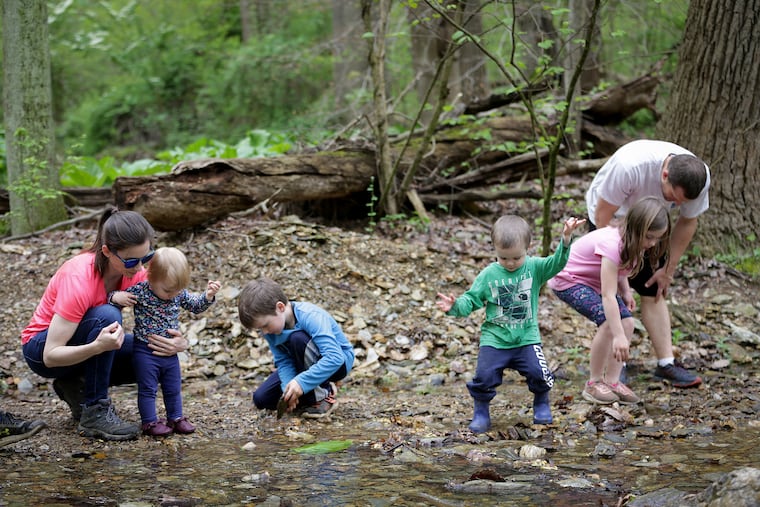A Main Line nature preserve is thriving amid coronavirus. Could it be a model for others to open?
With Valley Forge and so many other options unavailable, foot traffic at the nature preserve has jumped ninefold during the pandemic, requiring some creative rerouting.

In a densely developed and growing township that hosts one of the nation’s largest malls, the coronavirus crisis hit an obscure nature preserve in ways its keepers never could have anticipated.
Amid the avalanche of virus-related closings in March, the 93-acre McKaig Nature Education Center in the Wayne section of Upper Merion Township chose the path less traveled by: It stayed open. It was a popular decision — almost too popular.
McKaig, operated on a boot-string budget, suddenly became a hot spot. Foot traffic jumped ninefold, up to 500 visitors a day, park ranger Vytas Masalaitis said last week.
“People say, ‘I lived here 10 years; I didn’t know this was here,’” he said.
» READ MORE: Illegal parking, public defecation, overflowing trash cans: Crowds cause mess at parks during coronavirus pandemic
Concerned about aiding and abetting a rapidly spreading virus and the potential impacts on the woods’ nine trails, vegetation, and wildlife — including the hatching salamanders in McKaig Creek — the park’s board shut the trails for two days while it figured out how to handle the newfound celebrity.
The result was a reconfiguration of the trails by the preserve’s volunteers, routing traffic one way in the tighter areas; building a new footbridge across the creek; and posting new signage reminding people to kindly stay away from each other. The modest remake might well be a prototype for other natural areas that are contemplating reopening.
About three miles away in Berwyn, Chester County, the closed Jenkins Arboretum — famous for its rhododendrons and in danger of losing the peak azalea season — is looking at the McKaig strategy, said Tom Smarr, the executive director.
“This is a model we are considering for our narrower pathways that run through sections of our plant collections,” he said.
Repurposing the woods
“Never,” Masalaitis responded last week through a Darth Vader-like protective mask when asked if he ever had seen crowds like this at McKaig, which he has been visiting since 1966. He joined the board about 25 years ago and has been the ranger since 2011.
He recalled that the board of directors was divided over whether to close the woods, but came down on the side of staying open, with modifications. “One of the things we worry about with everybody sheltering at home is the mental part of it,” he said.
» READ MORE: Your guide to going outside (safely) right now
The built-out township, home of the King of Prussia Mall and whose population has jumped about 10 percent since 2010, also was bullish on keeping it open, Masalaitis said.
One choke point was the most popular entrance, on Croton Road next to what likely is the only school parking lot that is consistently filled with vehicles these days; it’s the favored parking area for people driving to the woods.
McKaig also closed off the “beach,” a congregating area along the creek near a trail intersection.
The one-way signs meant that visitors couldn’t exit the park at the Croton entrance, and that was intentional, Masalaitis said. “We directed visitors to explore the entire trail system, therefore spreading them apart, and this reduced close distance and so they would not need to pass opposing hikers.”
It updated the directions and rules and posted them on its website and Facebook page.
Masalaitis said that the increased traffic has caused some collateral damage to the trails and vegetation and was fatal to some hatching salamanders, prompting the park to put up caution tape along the creek.
However, overall the crowding has been manageable and people have been diligent about keeping social distance.
“With more people comes more maintenance, but it’s not an exponentially bigger problem,” he said.
After the coronavirus
Parks in neighboring counties are planning to reopen or already have, but Masalaitis is confident that McKaig has found new followers.
The park receives no public money and relies solely on contributors, and this year it stands to lose its major fund-raising event, usually held in early June. Asked if the influx of visitors had yielded an influx of dollars, he said, “Yes, some, but not proportionally. Many new visitors don’t know that we’re a visitor-funded park.”
Masalaitis himself is paid a small “stipend,” he said. The board and those who maintain the trails and rest of the park are volunteers.
The park is operated by the Upper Merion Park and Historic Foundation, formed in 1964, and named for Annah Colket French McKaig, whose family donated the land.
It might have taken a half-century, but the park has emerged from obscurity; all it took was a global pandemic.